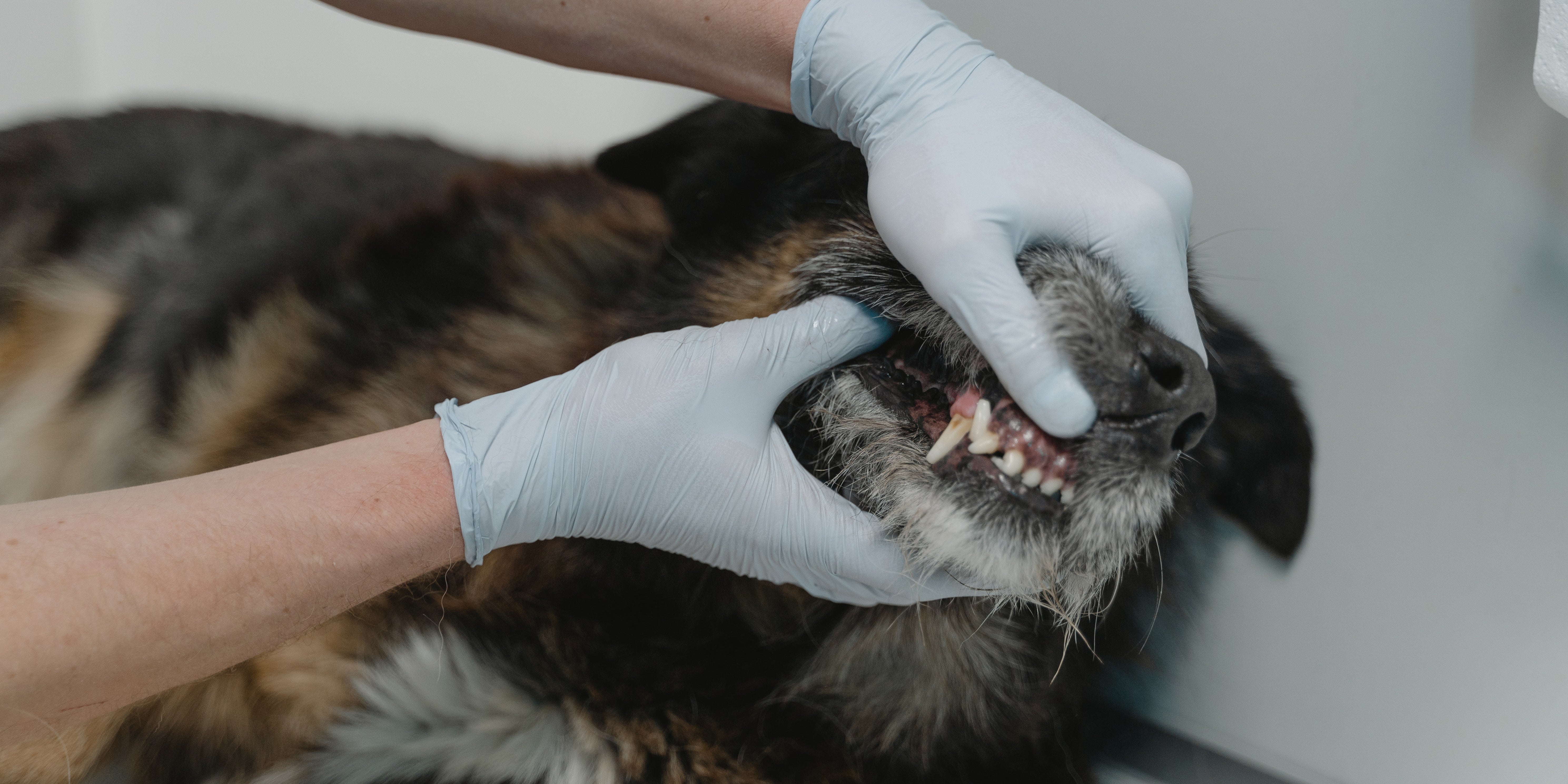Your Cart is Empty
{# PADRE SIN ENLACE #} Electronic Collars
{# PADRE SIN ENLACE #} Collars and Leads
{# PADRE SIN ENLACE #} Dog Tracking Systems
{# PADRE SIN ENLACE #} Dog Training
{# PADRE SIN ENLACE #} Bird Launchers
{# PADRE SIN ENLACE #} Hunting Dog Supplies
{# PADRE SIN ENLACE #} For The Hunter
Signs Your Dog May Have Dental Pain
February 09, 2023 4 min read

A dog has 42 adult permanent teeth, 20 on top and 22 on the bottom jaw. With that many teeth, your dog is bound to get a tooth ache or two throughout their lifetime. In this article, we will cover several signs to look out for to indicate that your dog may be experiencing dental pain. Dogs would let us know that they hurt if they could talk but because they can’t, it is important for us dog owners to know how to read the signs.
Good dental care and hygiene is important to maintaining overall good health of your dog. Many dental concerns can lead to serious health problems if left untreated. For more information on general canine dental health, check out our Importance of Dog Dental Health article.
-
Refuses to Eat or Changes in Eating Habits
One of the easiest signs that your dog is having tooth issues is if they change their eating habits. Most dogs like to eat, and some eat each meal like they have never eaten before. If your dog is refusing to eat, eats slower than normal, refuses to eat hard food, or is dropping large amounts of food out of their mouth while chewing; all of these can be signs of dental issues. Much like us, when we have tooth pain, we try to eat on the opposite side of our mouths or may lose our appetite. The same thing happens to our dog; they will lose their appetite, try to only eat soft foods, or become messy eaters trying not to hit that sensitive area.
-
Develops Bad Breath
We all heard that dogs have puppy breath, but bad breath is actually a sign of bad dental health. If your dog develops bad breath suddenly, it could be a sign of infection caused by a tooth abscess or gum infection. Some “doggy breath” is normal unless you are brushing their teeth regularly, but if the odor is foul, it likely indicates dental issues. These issues are important to notice, because an infection of the gums and teeth can get into the dog’s bloodstream and cause major health consequences.
-
Swollen and Red Gums
A dog’s gums should be a powder-pink color. If your dog’s gums are dark red and swollen, this could also indicate that your dog has an infection. Gum infections could lead to gingivitis and periodontitis. If the infection is bad enough, the swelling could also spread into the lips and other parts of the face. Periodontitis, if left untreated, will destroy your dog’s jawbone, leading to loss of teeth and weakening the jawbone structure.
-
Gums That Bleed Easily
It is normal to notice some blood on your dog’s chew toys from time to time, but if you are noticing large amounts of bloodstains on their toys or blood around their food bowl, this could be a glaring red flag indicating a dental issue. Frequent bleeding from the gums, like swollen and red gums, can be a sign of gum infections or periodontitis.
-
Drools More Than Normal
I had a Black Labrador Retriever growing up that would drool like crazy every time he would watch us eat. This type of drooling is normal. What is not normal is drooling all the time, as this is a sign of pain in dogs. If your dog is drooling more than normal, it is important to schedule a veterinarian checkup. Excessive drooling is a sign of pain, although not necessarily only dental pain. It could also be a sign of other illness and/or internal pain.
-
New or Strange Behaviors
As a dog owner, we need to learn to how to read canine body language. Knowing how to read their body language can teach you a lot about how they are feeling. Body language that would indicate dental issues like a toothache or gum infection include:
- Pawing at their mouth
- Swatting at their face
- Licking their nose often
- Scratching at their ears
- Sneezing more often
- Crying while yawning
-
No Energy, Depression, and Irritability
When you are not feeling good, you normally feel unmotivated and just want to rest. Much is the same for your dog(s). When a dog is not feeling good, they will seem depressed. Some will even isolate themselves and hide. Often, they will become irritable and unwilling to do things that normally would excite them. Of course, they will also sleep more than their usual amount.
-
Tooth Discoloration
A healthy dog’s teeth should be a shade of white. Canine teeth, like that of humans, will begin turning yellow and brown if they are not taken care of. This is caused by excess tartar forming on the teeth. This over time will cause damage to the teeth and inflame the gums, often leading to gum infections. If you think your dog has a toothache, checking for a discolored tooth will often show the problem area. Tartar build-up on canine teeth is easily preventable by regular dental care. These consist of dental chews, teeth brushing, and dental wipes. We cover these in our Importance of Dog Dental Health blog. Make sure to check back in the upcoming weeks for a future article that will be focused on canine teeth brushing and a review of products to make brushing your canine’s teeth easier.
Conclusion
No one wants a toothache. If your dog has one, it is important to notice it before it becomes too big of an issue. Short term: it can cause pain, discomfort, and stress on our dog. If it is a working or hunting dog, you will notice that they are off their game, lack drive, and are not performing as they normally would. Long term: dental issues like toothaches and infections can cause serious health issues for your dog. Hopefully after reading this article, you can now spot the signs that your dog is having a toothache and get them taken care of before it becomes a larger problem.
Thank you for reading. If you have any questions on dog toothaches or dental products, please leave us a comment or reach out to our customer service team via phone (1-800-662-5202), or our live chat during normal business hours.
Michael Cassatt, LCS Director of Marketing
Leave a comment
Comments will be approved before showing up.

Subscribe
Sign up to get the latest on sales, new releases and more …
Lion Country Supply — Trusted Hunting Dog Supply Store Since 1974 | Over 50 Years Serving Bird Dog Owners



